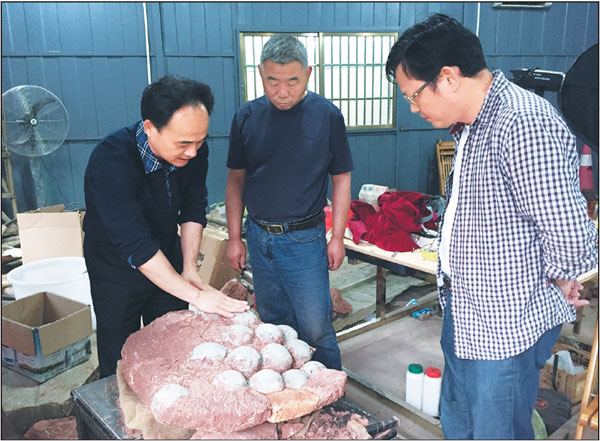'Dinosaur hometown' keeps researchers in awe
By Li Wenfang in Guangzhou (China Daily) Updated: 2017-02-01 07:39City in Guangdong abounds in fossilized eggs, bones and tracks of the prehistoric creatures
In a city with a population of more than 3 million, it may be hard to imagine that dinosaurs used to roam about tens of millions of years ago, but in Heyaun, Guangdong province, that thought doesn't seem so other-worldly anymore.
Since 1996, the city has held a unique and important position in dinosaur research, with so far 16,045 dinosaur fossils - such as eggs and bones - and footprints having been found.
In 1996, four high school students spotted a nest of seven eggs in a construction site. They played with one like a soccer ball, and one teen took it home. The teen's father, who was a teacher, suspected it was a dinosaur egg and handed it over to the city museum's curator at that time, Huang Dong.
Today, the city officially bears the title "Hometown of the Dinosaur in China", and in 2004 its museum set a Guinness world record for having the world's largest collection of fossilized dinosaur eggs: 10,008 .
Heyaun holds a unique position in dinosaur studies by having dinosaur eggs, bones and tracks all in one area.
A dinosaur type found in 1999, a member of the oviraptorid, birdlike family that lived 65 million years ago, during the late cretaceous period, was named Heyuannia huangi in honor of the place of its discovery and the curator Huang, who found many fossils.
It was the first oviraptor found in China - most others were found in Mongolia.
Heyuannia is a medium-sized oviraptor and a stage in the transition from dinosaur to bird, according to Wu Junchang, a researcher at the Chinese Academy of Geological Sciences.
It was toothless, measured 2 to 3 meters in length and looked like an ostrich. Wu said that at a time when many dinosaurs had become extinct, Heyuannia strived to move from the land to the sky and take flight as a bird.
According to Zhao Zikui, a professor at the Chinese Academy of Sciences' Institute of Vertebrate Paleontology and Paleoanthropology, Heyuan is known as the most suitable place on Earth for a dinosaur egg museum. Zhao, who researches dinosaur eggs, said it is the larger Nanxiong Basin in Guangdong makes it ideal for studying dinosaur extinction.
With the fossils in Heyuan, researchers can study dinosaur extinction, the ancient environment and geological formation, and the protection of our planet, said Du Yanli, the Heyuan museum's current curator.
The typical red sandstone formations in the area make the fossilized egg finds common, he said.
With red sandstone structure extending more than 100 square kilometers in the city, more dinosaur discoveries are possible.
Because the dinosaur fossils are usually located close to the ground's surface in the city, they are relatively easy to spot during construction work.
In addition to the paleobiological findings in Heyuan, which include Tyrannosaurus rex, turtle and ammonoid - an extinct mollusk - is an insect trace fossil was discovered in April.
This further proves the abundant types and amounts of paleobiological species that lived along the Dongjiang River, Wu said.
In 2014, a number of mini fossilized eggs were unearthed in Heyuan. They were no more than 2 centimeters in diameter and some had crystallized matter inside. Scientists have yet to determine what species laid the eggs.
Sixty-five million years ago, Heyuan was a large swamp, with a mild climate and abundant rainfall. It had no high mountains or deep valleys. Those came after the dinosaur extinction. Swampland gradually became mountains, turning dinosaur remains into fossils.
For better protection, an area measuring 2.26 square kilometers in the city has been set aside as dinosaur relics reserve.
With the craze for fossils, the economic value of dinosaur relics has grown, leading to cases of haphazard excavation of fossils, and worsening illegal collections and black market trade.
Regulation on the protection of dinosaur geological relics in Heyuan was approved at a meeting of the standing committee of the Guangdong provincial people's congress in December.
Signifying the further legalized protection of the fossils, the regulation is seen by the local government as opening the opportunity for playing up the city's unique cultural resource, building up its cultural brand and enhancing the tourism sector.
liwenfang@chinadaily.com.cn
|
Researchers clean and prepare fossilized eggs for display. The eggs were found along Datong Road, Heyuan, in 2016. Heyuan has the largest collection of dinosaur eggs in the world.For China Daily |
- 'Cooperation is complementary'
- Worldwide manhunt nets 50th fugitive
- China-Japan meet seeks cooperation
- Agency ensuring natural gas supply
- Global manhunt sees China catch its 50th fugitive
- Call for 'Red Boat Spirit' a noble goal, official says
- China 'open to world' of foreign talent
- Free trade studies agreed on as Li meets with Canadian PM Trudeau
- Emojis on austerity rules from top anti-graft authority go viral
- Xi: All aboard internet express












